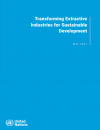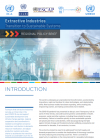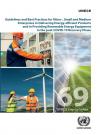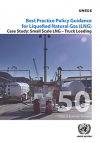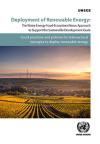Publications
Displaying Results 21 - 40 of 80
- English
Historically, extractive industries have also been a major driver of economic growth, particularly for now-advanced economies that benefitted during and after the Industrial Revolution. Currently, mineral resource extraction plays a dominant role in the economies of 81 countries that account for a quarter of global GDP, half of the world’s population and nearly 70 per cent of those living in
- English
The COVID-19 pandemic has presented an abrupt, even if temporary, halt to some of these trends, and underscored systemic vulnerabilities in health, economic, social and other systems, including those related to energy and industry. Failure to transition quickly to more sustainable systems will perpetuate these vulnerabilities, while also jeopardizing the fight against climate change and
- Pусский
- Français
- English
Micro-, small and medium enterprises (MSME) are prominent in sectors affected by the COVID-19 pandemic. MSME in the energy efficiency and renewable energy sectors were implementing innovative, circular, green and sustainable initiatives before the onset of the COVID-19 pandemic, so they are well-placed to contribute to the post-COVID-19 recovery. However, on both the supply and demand sides MSME
- English
Promoting Energy Efficiency Standards and Technologies to Enhance Energy Efficiency in BuildingsECE Energy Series No. 60Geneva, 2020Buildings today are responsible for approximately one third of total final energy consumption and account for almost 40 percent of carbon dioxide emissions. Advanced technical solutions
- English
Towards sustainable renewable energy investment and deployment. Trade-offs and opportunities with water resources and the environment (advance version of December 2019)Renewable energy technologies can be used to improve access to water and
- English
Hard Talks in ECE Countries on How to Increase Renewable Energy UptakeThis publication explores the outcomes of Hard Talks carried out in Azerbaijan, Bosnia and Herzegovina, Georgia, Kazakhstan, Serbia and Ukraine, from 2016 until early 2019. The study provides an outline of
- English
- English
Status and Perspectives for Renewable Energy Development in the UNECE Region 2017The UNECE and the German Energy Agency (dena) have joined forces to issue this report, which features good practices for and experiences of renewable energy policymaking. All countries can benefit from the
- English
- English
Removing Barriers to the Use of Natural Gas as Maritime Transportation FuelENERGY SERIES No. 54This report on Removing Barriers to the Use of Natural Gas as Maritime Transportation Fuel is another step in ourexploration of the catalytic role of natural gas in attaining the Sustainable Development Goals, and in
- English
Best Practice Policy Guidance for Liquefied Natural Gas (LNG)Case Study: Small Scale LNG – Truck LoadingENERGY SERIES No. 50The transportation of Liquefied Natural Gas (LNG) via truck loading is a fast growing vector of natural gas delivery and the main alternative to supply via pipelines. According to the
- English
- English
The United Nations Economic Commission for Europe (UNECE) and Renewable Energy Policy Network for the 21st Century (REN21) issued the REN21 UNECE Renewable Energy Status Report 2017. The UNECE Renewable Energy and Energy Efficiency Status Report 2017 provides a comprehensive overview of the current
- English
The water-energy-food-ecosystems nexus approach comes in with the objective of promoting coordination and integrated planning and sustainable management of interlinked resources across sectors, which could speed up the achievement of the 2030 Agenda for Sustainable Development. The nexus could leverage deployment of renewable energy across the Goals. The meaning of “nexus”, in the context of
- English
- English
Experience in the Europe & CIS Region with Clean Energy -UNDP, GEF and UNECEThe sixth day of October 2016 was a historic day for global efforts to combat climate change. The Paris Agreement entered into force as more than 55 countries representing 55% of total global greenhouse gas emissions have now
- English
The Role of Gas in Sustainable Energy (Booklet - December 2015)Liquefied natural gas (LNG) – towards global gas marketsRecent market developments point to a fundamental change in the role of Liquefied Natural Gas (LNG) in the global energy landscape. The use of LNG to transport natural gas is poised to grow dramatically
- English
Energy Efficiency – Getting more from less (Booklet - December 2015)Improving energy efficiency contributes to energy security, better environment, quality of life, and economic well-being for all. Energy efficiency is called “the first fuel” as it is the best way of getting more out of existing resources


